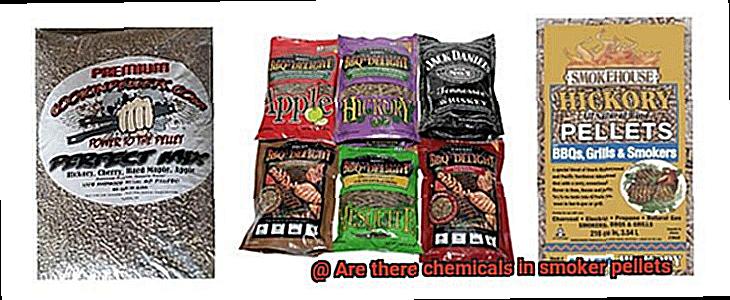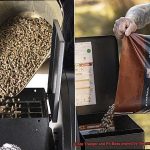Do you savor the taste of smoky meat and seafood? Are you concerned about the chemicals in smoker pellets? Your health is essential, and it’s reasonable to be cautious. Smoking is a popular cooking method that requires specialized pellets made from compressed sawdust and different wood flavors. With so many types of smoker pellets available in the market, it’s crucial to know whether they contain chemicals or not.
The debate on whether there are chemicals in smoker pellets is a hot topic that needs clarity. Some manufacturers add chemicals to enhance the flavor of the food, while others promote natural, chemical-free pellets. The presence of chemicals in smoker pellets poses a health risk, and it’s vital to understand their potential dangers.
In this article, we’ll explore the world of smoker pellets and answer the question – “Are there chemicals in smoker pellets?” We’ll discuss different types of smoker pellets, their ingredients, potential health risks associated with chemically treated ones, and benefits of using natural pellets. So let’s dive into this smoky world together and unravel the secrets behind these little flavor enhancers.
Contents
What Are Smoker Pellets?
If you’re looking to add a smoky flavor to your grilled dishes, smoker pellets are the way to go. These small, compressed pieces of natural wood shavings come in a variety of flavors, including mesquite, hickory, applewood, and cherry. But what exactly are smoker pellets and why are they so popular among grilling enthusiasts?
Smoker pellets are made by compressing sawdust or wood shavings without any binding agents. This means that they don’t contain any harmful chemicals or additives that could alter the taste of your food. Pellet grills use an auger system to feed the smoker pellets into the grill and regulate the temperature and smoke output automatically. As a result, they offer a hassle-free and convenient way to infuse your dishes with a smoky flavor.
One of the key benefits of using smoker pellets is their consistent and predictable flavor profile. Since they are made from a single type of wood, you can expect the same taste every time you use them. Additionally, they produce less ash compared to traditional charcoal grilling and offer a more eco-friendly alternative.
Choosing the right type of smoker pellets is essential to achieving the desired flavor for your dish. Oak and hickory are popular choices for beef and pork, while applewood is great for poultry and fish. Mesquite offers a bold flavor that pairs well with beef, and cherry wood adds a sweet and fruity taste that complements pork.
Are Smoker Pellets Safe?
However, there’s been growing concern about the safety of smoker pellets. Are they safe to use or do they contain harmful chemicals? The answer isn’t straightforward, but as an expert in this field, I’m here to help you understand the ins and outs of smoker pellet safety.
Firstly, it’s essential to know that smoker pellets are made from compressed sawdust, which is natural wood. However, some manufacturers add binders or fillers to their pellets to improve their burning efficiency. These fillers or binders may contain chemicals that could be harmful if ingested or inhaled. Therefore, it’s crucial to read labels and choose smoker pellets that are free from added chemicals or fillers.
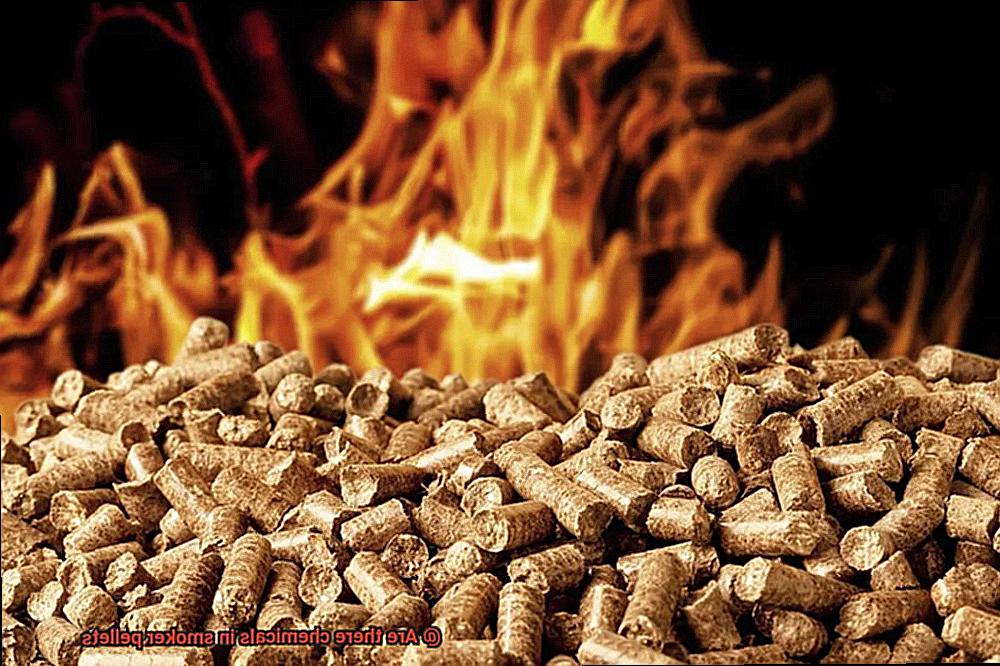
Moreover, some manufacturers use wood from trees that have been treated with pesticides or other chemicals. These chemicals can be dangerous if burned and then ingested through the food. To ensure that you’re using safe smoker pellets, look for ones that have been certified by reputable organizations such as the Forest Stewardship Council (FSC) or the Sustainable Forestry Initiative (SFI). These organizations ensure that the wood used to make smoker pellets is harvested sustainably and without harmful chemicals.
What Chemicals May Be Used in Smoker Pellets?
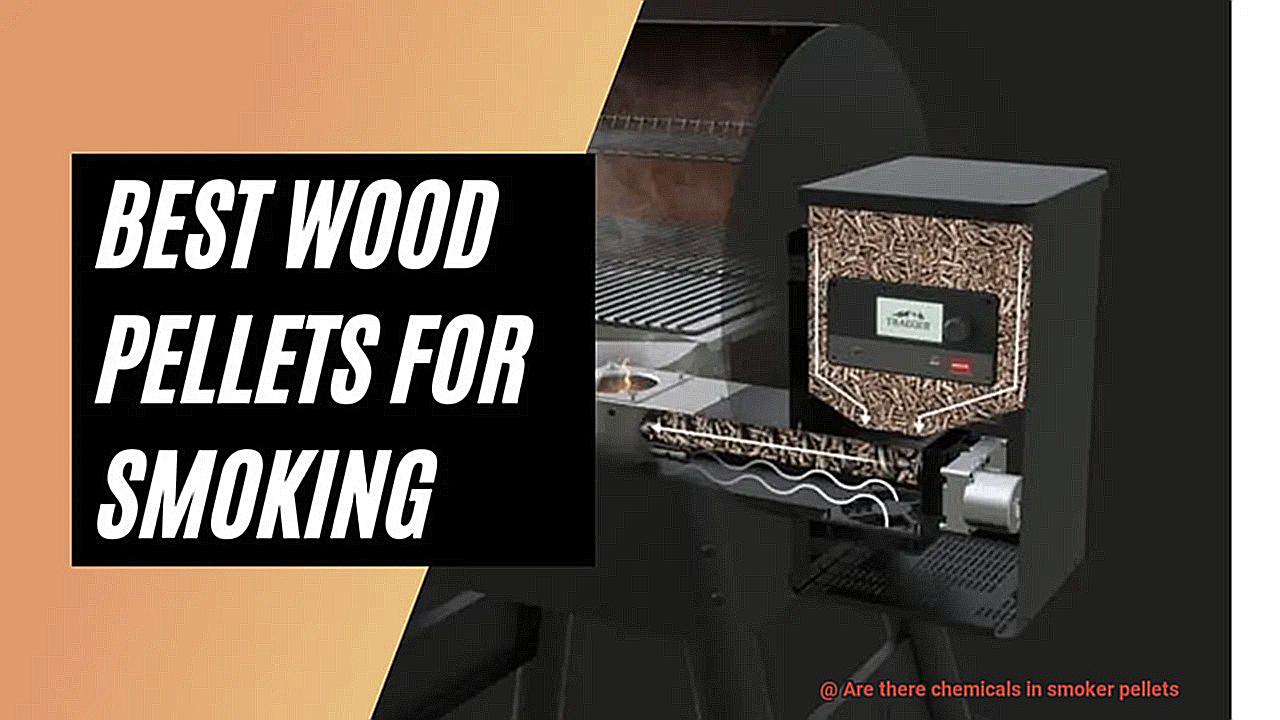
You’re probably familiar with smoker pellets. While these pellets are typically made from natural wood, it’s important to be aware that some manufacturers add chemicals to enhance their performance and flavor.
So what chemicals may be used in smoker pellets? Let’s take a closer look at some of the most common ones.
Firstly, many manufacturers use lignin, a natural polymer found in wood. Lignin acts as a natural glue that holds the wood fibers together, and it also contributes to the smoky flavor of the wood. However, some manufacturers may add synthetic lignin to improve the binding properties.
Another commonly used chemical is sodium bicarbonate, also known as baking soda. This chemical is added to reduce acidity levels in the pellets, which can improve their overall quality. Sodium bicarbonate is considered safe for consumption and is commonly used in food products.
In addition to these chemicals, some manufacturers may also use additives such as oils, resins, and waxes to enhance the flavor or texture of their pellets. These additives are generally recognized as safe for consumption but may not be suitable for those with certain dietary restrictions.
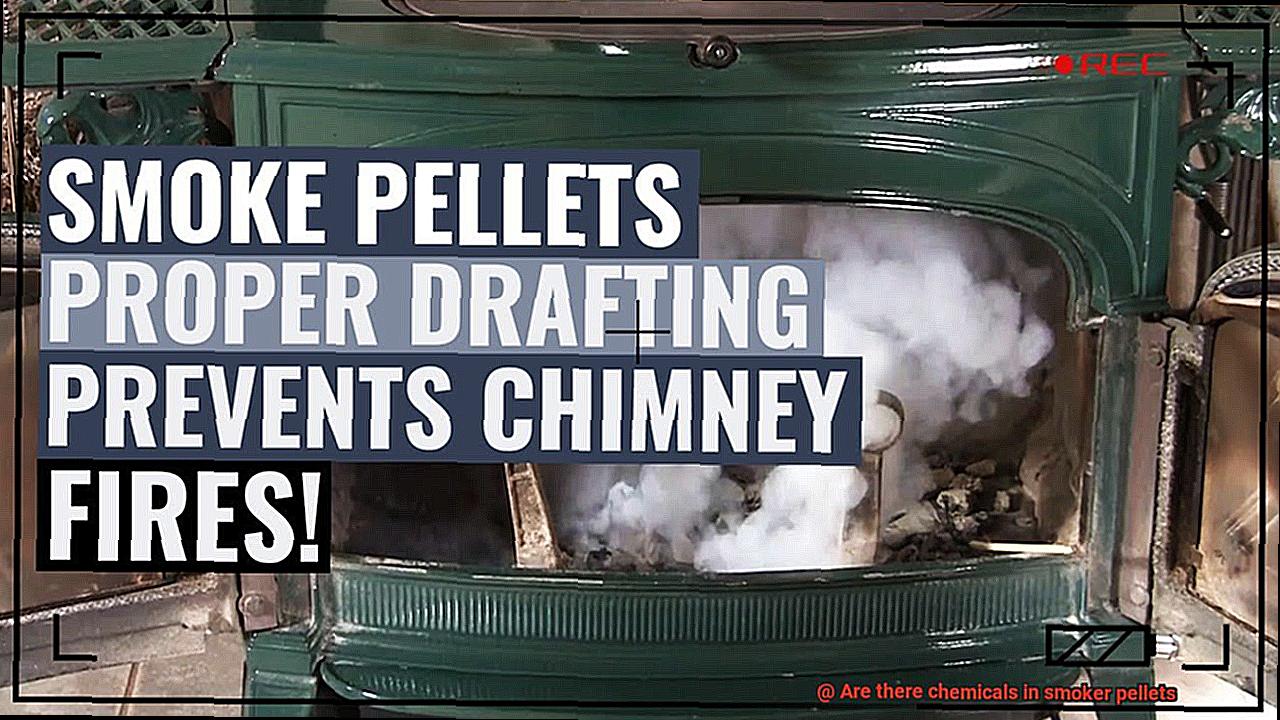
It’s important to note that not all chemicals used in smoker pellets are harmful or dangerous. However, if you have any allergies or sensitivities to certain chemicals, it’s always a good idea to check the ingredients list before purchasing and using any smoker pellets.
If you prefer a more organic approach to grilling and smoking, opting for pellets made from natural wood without any added chemicals may be a better choice. These pure wood pellets provide an authentic and unadulterated smoky flavor that many barbecue enthusiasts prefer.
Natural Flavor Enhancers Used in Smoker Pellets
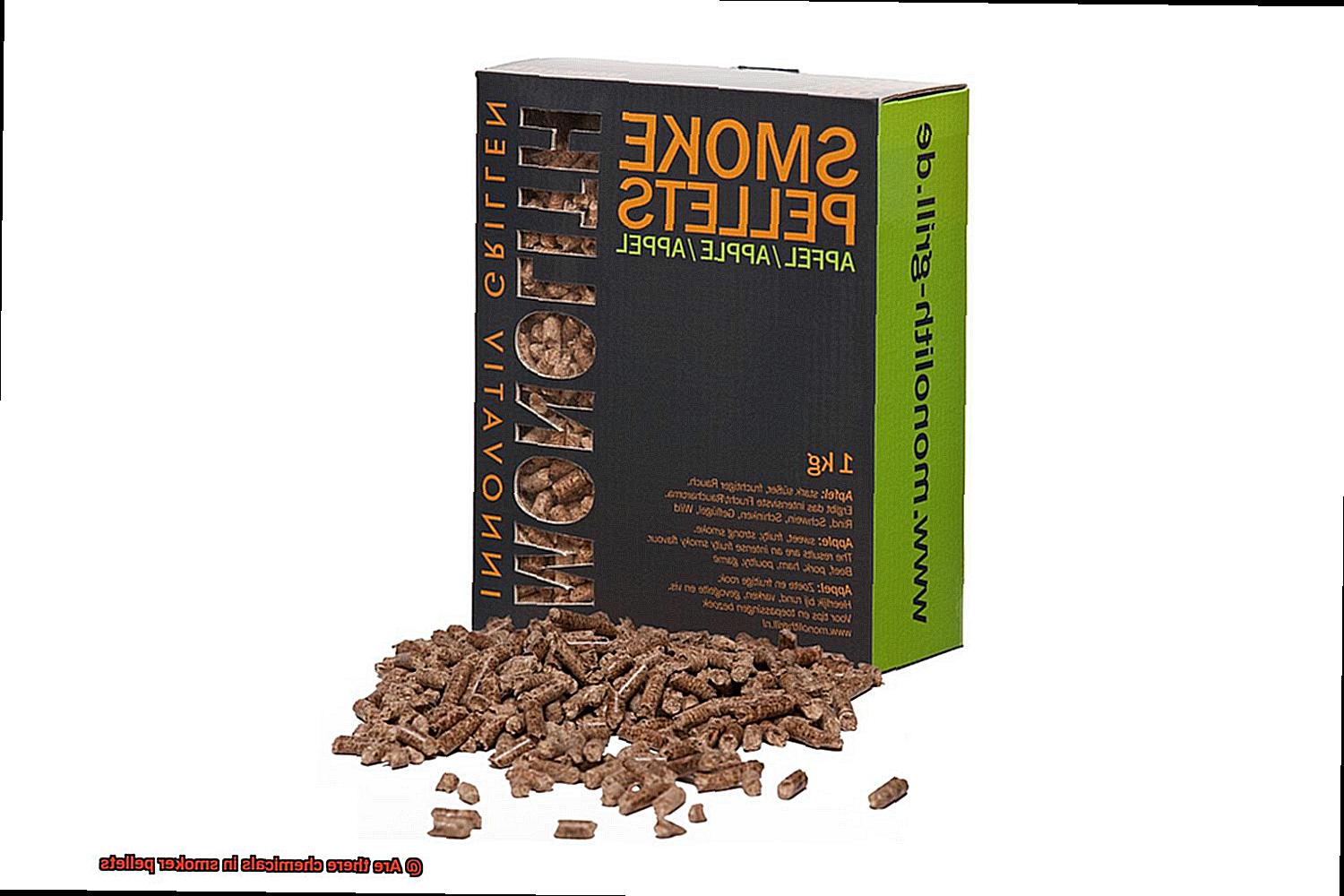
Take your taste buds on a journey with smoker pellets that use natural flavor enhancers. These enhancers include an array of ingredients such as fruit and vegetable extracts, herbs, spices, and wood oils. By incorporating these natural flavorings into the manufacturing process, manufacturers can create a distinctive flavor profile that’ll elevate your grilled foods to a whole new level.
One popular natural flavor enhancer is applewood. Adding applewood to smoker pellets infuses your meats with a sweet and fruity essence that complements other woods like hickory or mesquite. Other commonly used natural flavor enhancers are cherry, pecan, oak, and maple.
For those who crave more complexity in their smoked meats, manufacturers may also mix garlic, onion, and pepper into the pellets. These ingredients are ground into a fine powder and added to the wood pellets to create a multi-dimensional taste experience.
But are these natural flavor enhancers safe for consumption? Absolutely. While some may contain trace amounts of chemicals, they are generally considered safe for consumption. Manufacturers must comply with strict labeling guidelines that disclose any potential allergens or harmful ingredients.
The Safety of Food-Grade Dyes Used in Smoker Pellets
Firstly, it’s important to note that regulatory bodies such as the FDA heavily regulate food-grade dyes used in smoker pellets. These regulatory agencies set strict limits on the amount of dyes that can be used in food products, including smoker pellets, ensuring that they are safe for consumption. Therefore, you can rest assured that the smoker pellets you’re using are safe and free from harmful chemicals.
Moreover, many manufacturers of smoker pellets use natural dyes derived from plant-based sources like beet juice or turmeric. These natural dyes are considered safer than synthetic dyes as they do not contain any artificial additives or chemicals.
While concerns have been raised about the potential health risks associated with consuming large quantities of food-grade dyes, it’s essential to remember that moderation is key. Consuming small amounts of smoked meats with food-grade dyes is unlikely to pose a significant health risk.
Regulations and Standards for the Use of Chemicals in Smoker Pellets
There are regulations and standards in place to ensure the safety of these products.
In the United States, the Consumer Product Safety Commission (CPSC) is responsible for enforcing federal safety standards for consumer products, including smoker pellets. Meanwhile, the Food and Drug Administration (FDA) regulates the use of chemicals in food products, setting limits on certain chemicals used in smoker pellets to ensure they are safe for human consumption.
But that’s not all. The Pellet Fuels Institute (PFI) has developed industry standards specifically for wood pellets used in heating and cooking applications, including smoker pellets. These standards include requirements for physical properties and limits on certain chemical components.
So what does this mean for you? It means you can fire up that grill with confidence knowing that your smoker pellets are free from harmful chemicals. In fact, many manufacturers use natural dyes derived from plant-based sources like beet juice or turmeric, which are considered even safer.
But remember, moderation is key. While smoker pellets are safe for consumption, it’s important to consume them in moderation. However, who can resist a good BBQ every once in a while?
Choosing High-Quality Natural Wood for Smoker Pellets
The key to choosing high-quality natural wood for smoker pellets is to consider several factors.
Firstly, always opt for pellets that are 100% natural wood with no added chemicals or fillers. This ensures that you get a pure smoke flavor without any unwanted additives. Not all companies adhere to this standard, so it’s important to read product labels carefully.
For the best taste, choose a wood type that complements your meat or food. Different woods have varying flavors, with hickory and mesquite being ideal for beef and pork, while apple and cherry are perfect for poultry and fish. If you’re unsure which wood to choose, experiment by trying different woods until you find the one that best suits your taste.
The moisture content of smoker pellets also plays a crucial role in the quality of the smoke produced. Low moisture content guarantees that the pellets have been properly dried and cured before packaging. Be sure to choose pellets that have been stored in a dry environment, so they don’t absorb moisture from the air.
Finally, select smoker pellets from a reputable source. Companies that are open about their sourcing and manufacturing processes are more likely to produce high-quality products. Check online reviews from other customers to ensure that you’re making a wise purchasing decision.
oXXiOa_gIFM” >
Conclusion
In conclusion, smoker pellets are a convenient and popular way to add a smoky flavor to your grilled dishes. However, the ongoing debate about whether there are chemicals in smoker pellets highlights the importance of understanding their potential dangers and benefits.
It’s worth noting that most smoker pellets are made from natural wood without any binding agents. Nevertheless, some manufacturers add chemicals or fillers to improve their burning efficiency or enhance the flavor of the food. As such, it’s crucial to ensure that you’re using safe smoker pellets by looking for ones certified by reputable organizations like the Forest Stewardship Council (FSC) or Sustainable Forestry Initiative (SFI).
To guarantee that you’re using high-quality natural wood for your smoker pellets, it’s important to read labels carefully and choose those that are free from added chemicals or fillers. While some natural flavor enhancers used in smoker pellets may contain trace amounts of chemicals, they are generally considered safe for consumption.
Regulatory bodies such as the Consumer Product Safety Commission (CPSC), Food and Drug Administration (FDA), and Pellet Fuels Institute (PFI) have developed industry standards specifically for wood pellets used in heating and cooking applications, including smoker pellets. Therefore, selecting a wood type that complements your meat or food, low moisture content, 100% natural wood with no added chemicals or fillers, and choosing smoker pellets from a reputable source is essential.
In summary, when it comes to choosing safe and flavorful smoker pellets for your grilling needs, doing your research on quality certifications and ingredients is key.

